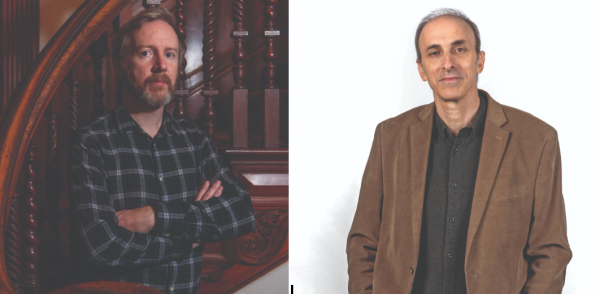November 4, 2022

Paul Murray, left, is the Burns Visiting Scholar in Irish Studies at Boston College this fall. Photo by Lee Pellegrini
At right, Sullivan Millennium Chair of Irish Studies Guy Beiner. Photo credit Caitlin Cunningham
Acclaimed Irish author Paul Murray and innovative historian Guy Beiner will be featured speakers at two events this month sponsored through the Boston College Irish Studies Program.
Murray, who is at BC this fall as the Burns Visiting Scholar in Irish Studies, will present the Burns Scholar Lecture, “How to Write a Novel,” on November 9 at 5:30 p.m. in the Thompson Room of the John J. Burns Library on BC’s Main Campus.
The following Wednesday, November 16, Beiner will give his inaugural lecture as the Craig and Maureen Sullivan Millennium Chair of Irish Studies at Boston College on November 16 at 5:30 p.m., also in the Thompson Room.
Both events are free and open to the public, and will be preceded by a reception at 4:30 p.m.
A Dublin native, Murray has written three highly praised novels: An Evening of Long Goodbyes, shortlisted for the Whitbread First Novel Award and the Irish Book Award; the bestseller Skippy Dies, shortlisted for various honors including the National Book Critics' Circle Award and named one of Time magazine's Best Books of 2010.; and The Mark and the Void, his acerbic take on the so-called “Celtic Tiger” that won the Bollinger Wodehouse Prize for Comic Fiction and made Time’s Best Books of 2015 list. Banshee Press has described his work as “urbane, dense, funny, brainy, [and] unpretentious.”
As the Burns Scholar, Murray is teaching a writing workshop in fiction for BC undergraduates, covering character development, point of view, voice, setting, imagery, sentence design, plot, pacing, and the use of time in a narrative. Students in the class commit to intensive writing, both in class and out, and full participation in the workshop editing process.
A collaboration between the Center for Irish Programs and University Libraries, the Burns Scholar program brings outstanding academics, writers, journalists, librarians, and other notable figures to the University to teach courses, offer public lectures, and work with the resources of the Burns Library in their ongoing research, writing, and creative endeavors related to Irish history, art, and culture.
At the November 9 event, Murray will read from his forthcoming novel, The Bee Sting, and share his thoughts about the creative process.
A self-confessed “contrarian,” Murray—then in his early 20s—observed the Celtic Tiger’s onset with skepticism and a certain distaste. Later, as revelations of (at best) unethical behavior within the financial industry surfaced—with little or no repercussions for those exhibiting it—Murray found himself compelled to learn more about the practices and policies that led to this reversal of fortune, and his self-education informs The Mark and the Void—full of peculiar characters and improbable events revolving around a Dublin investment bank that survived the 2008 global market crash.
“Being a writer is a good job for a contrarian: You can’t be fired from it,” said Murray. “I always wrote. As a kid, it was comics, later it was songs and film scripts. But writing fiction felt like the only thing I could do where I had complete control. I was lucky in that I met people on the way who pointed me in one direction or another.”
Beiner, who was appointed as the Sullivan Chair in 2021 and serves as director of the University’s Center for Irish Programs, will present “Paddies in Space: Irish Studies in the 24th Century”—his examination of science fiction depictions of the Anglo-Irish conflict in popular culture that reveal how imagining the future draws on cultural traditions from the past, and what this suggests about current attitudes toward the prospect of the reunification of Ireland.
Beiner’s unique expertise in memory studies has earned him honors such as a National Endowment for the Humanities Fellowship and the National University of Ireland Irish Historical Research Prize—the latter one of four major international awards he received for his 2018 book Forgetful Remembrance: Social Forgetting and Vernacular Historiography of a Rebellion in Ulster.
“Memory is not only about recalling who we were in the past,” said Beiner, “it is also about our identity in the present, with an eye towards where we see ourselves in the future.”
During Beiner’s tenure as Sullivan Chair, Irish Studies has hosted events commemorating key events in Irish history, including Bloody Sunday (the 1972 killings of protestors in Northern Ireland by the British Army) and the 1922-1923 Irish Civil War, as well as a conference on novelist, playwright, and satirist Flann O’Brien.
For information about these and other BC Irish Studies events, go to bc.edu/irish.

